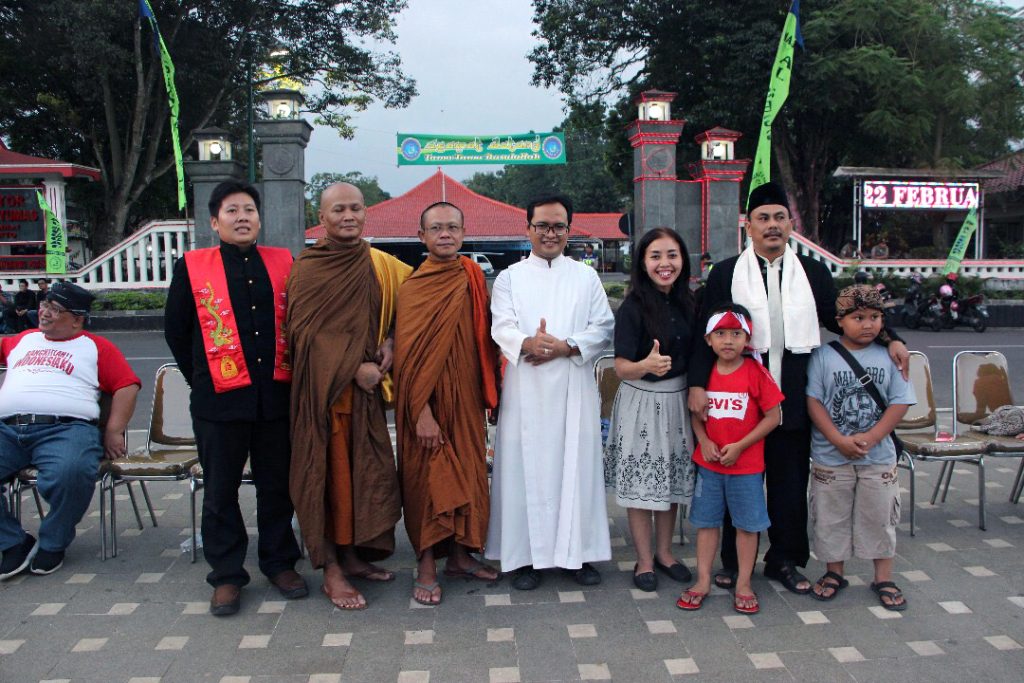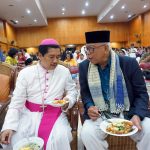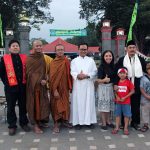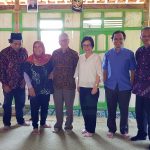Aventures missionaire – Indonesia
Understanding Interfaith Dialogue in Indonesia
Publié le 21/04/2023

Un prêtre lors de la réunion avec les chefs religieux musulman, bouddhiste et confucianiste.
Interview by François-Xavier de Lépinau
What is Interfaith Dialogue? What does it mean for you?
In essence, it’s a meeting. It is a meeting with a person from another religion or denomination, which can take place on three levels: in everyday life and everything that it involves: culture, mutual assistance, etc.; through a theological exchange, which is the area of intellectual understanding; or else a spiritual exchange.
How are relations between believers from different faiths in your country?
To understand how Interfaith Dialogue forms part of everyday life in my country, you have to understand the scope of the first principle of Pancasila. This introduces into the life of citizens a faith in one God, the God of one of the six religions that are officially recognised in Indonesia (Islam, Catholicism, Protestantism, Hinduism, Buddhism and Confucianism). The duty to choose one’s religion freely flows from this basic principle.
It is obvious that faith is a vital part of life in Indonesia. Religion is very much a part of the life of people in Indonesia, it is not confined to one’s private life. In fact, this openness to otherness – which is essential for Interfaith Dialogue – existed prior to the creation of the Indonesian state and is part of our culture. It is common to ask questions about belief, right from childhood. It is not a taboo subject! ‘How do you pray?’ ‘What is the Trinity?’ ‘Did Jesus really die and rise again’. Such questions are part of our everyday lives.
How did you yourself become part of this dialogue?
My father is a Muslim and my mother is Catholic, and each of them practises their own religion. Interfaith Dialogue blossomed even within my family. In fact, we fasted both during Ramadan and during Lent. In school, teachers might ask me about my Catholic faith even outside of religious knowledge lessons, which were compulsory. When I was a vicar, we would go together with the priests from my parish to visit all the religious heads in our district during the great Muslim feasts. Similarly, during the great Christian festivals, such as Christmas, that was an opportunity to organise ecumenical events to which the Christians would invite faithful from all religions in our area.
There are also links between Muslim and Catholic charitable organisations working for the common good. One of the best examples is that the economic and social services in my diocese provide assistance to everyone, whatever their religion.
How does it work nowadays?
From 1998 there has been a decentralisation of power, which has increased regional independence, allowing some regional laws to be passed that can conflict with the Constitution. Some of these laws can be more favourable to the religious majority in a particular region and, in so doing, oppress minorities. So, certain districts oblige Muslim women to wear the veil, and non-Muslims have to wear clothing that covers them up.
Another striking fact: a decree passed by two Indonesian ministers makes it compulsory for the construction of a religious building to have the agreement of all the religious heads in the area and at least sixty signatures from people living closest to the site. As a consequence, the construction of Catholic churches has become a problem in my diocese, where we only represent 0.4% of the population.
Also, since the first years of this century, Interfaith Dialogue has become institutionalised – before it was the result of personal initiatives. This change has been accompanied by abuses, such as the politicisation of Interfaith Dialogue and this can affect the spontaneity and simplicity of the links between different communities.
How are theological exchanges with Muslims?
Theological exchanges with Muslims are hard work. We do not have the same idea of dialogue. We Catholics, we like to explain and share the understanding we have of our faith. Muslims are more about force, it is like a debate where the objective is to convince the other person.
I remember one theological meeting of Catholics and Muslims organised as part of a course on Trinitarian Christology when I was still in the seminary. The meeting had degenerated, the Muslims were attacking us, claiming that we did not believe in a single God but in three gods and, by so doing, we breached the first principle of Pancasila. They would not listen. In everyday life, culturally and socially, relations with Muslims are easy and simple but when we talk about theology, tensions can surface quickly. Confronting another person in an area – their religion – where they are fundamentally different is very testing. At the same time it is the kind of meeting that, even though on occasion it can be painful, enables us to become firmly rooted in our faith as we question it.
So how can one anchor the dialogue spiritually?
Spiritual dialogue has real intensity. I think of it as a sharing of one’s personal experience of one’s faith.
It is a time to be a witness to one’s faith: how do I live my own meeting with God? What does my faith change in me? What legacy does it leave?
To arrive at this level of dialogue, some special conditions are required. The first is that both I and the person I am speaking with have a life of deep faith. It is not a question of dogma or a purely intellectual faith. In addition, there needs to be a common culture – Javanese in my case – that unites us from the start, that too is a precious ingredient. In fact, culture can serve as a doorway to a discussion about one’s inner life.
I would like to note that this very special type of relationship is possible with some Muslims on my island, people who embody their religion within our cultural tradition. Such moments are rare, making them even more precious.
One other form of spiritual dialogue comes to mind: it occurs when someone close dies. For us, these are very important events during which the family, regardless of its religion, joins round the deceased to pray. When facing the mystery of life – and its impermanence – in that humble union of prayer of different faiths, a spiritual union comes forward which transcends us. It may be that in those unique moments, when we stand humbly before God, to whom our prayers are addressed, free of other interference (pride, fear), that a true unity is able to emerge, beyond our differences.
Indonesia at a glance
The Indonesian nation was created in 1945. Before then, it was divided into several independent kingdoms and different ethnic groups. For the builders of this young nation, the challenge was to uncover what could be a unifying factor in this cultural and geographic mix, comprising more than 700 languages and more than 300 different ethnic groups or tribes, and could therefore act as the foundation for a national identity. Five principles (the Pancasila) describing the coherence of the Indonesian nation were therefore put forward. These are the principles that inspired the Constitution: 1. Belief in one God; 2. A just and civilized humanity; 3. Unity of the Indonesian people; 4. A democracy guided by wisdom through the deliberation and representation of the people; 5. Social justice for all Indonesian people.
- Un imam musulman est invité lors du repas pour fêter l’ordination de Mgr. Christophorus Tri, évêque du diocèse de Purwokerto.
- Un prêtre lors de la réunion avec les chefs religieux musulman, bouddhiste et confucianiste.
- Silaturahmi lebaran (rendre visite lors de la fête de l’Aïd-el-fitr) d’un curé avec ses vicaires et son équipe pastorale.


